Zihao Lin
MiLDEdit: Reasoning-Based Multi-Layer Design Document Editing
Jan 08, 2026Abstract:Real-world design documents (e.g., posters) are inherently multi-layered, combining decoration, text, and images. Editing them from natural-language instructions requires fine-grained, layer-aware reasoning to identify relevant layers and coordinate modifications. Prior work largely overlooks multi-layer design document editing, focusing instead on single-layer image editing or multi-layer generation, which assume a flat canvas and lack the reasoning needed to determine what and where to modify. To address this gap, we introduce the Multi-Layer Document Editing Agent (MiLDEAgent), a reasoning-based framework that combines an RL-trained multimodal reasoner for layer-wise understanding with an image editor for targeted modifications. To systematically benchmark this setting, we introduce the MiLDEBench, a human-in-the-loop corpus of over 20K design documents paired with diverse editing instructions. The benchmark is complemented by a task-specific evaluation protocol, MiLDEEval, which spans four dimensions including instruction following, layout consistency, aesthetics, and text rendering. Extensive experiments on 14 open-source and 2 closed-source models reveal that existing approaches fail to generalize: open-source models often cannot complete multi-layer document editing tasks, while closed-source models suffer from format violations. In contrast, MiLDEAgent achieves strong layer-aware reasoning and precise editing, significantly outperforming all open-source baselines and attaining performance comparable to closed-source models, thereby establishing the first strong baseline for multi-layer document editing.
SuperFlow: Training Flow Matching Models with RL on the Fly
Dec 17, 2025Abstract:Recent progress in flow-based generative models and reinforcement learning (RL) has improved text-image alignment and visual quality. However, current RL training for flow models still has two main problems: (i) GRPO-style fixed per-prompt group sizes ignore variation in sampling importance across prompts, which leads to inefficient sampling and slower training; and (ii) trajectory-level advantages are reused as per-step estimates, which biases credit assignment along the flow. We propose SuperFlow, an RL training framework for flow-based models that adjusts group sizes with variance-aware sampling and computes step-level advantages in a way that is consistent with continuous-time flow dynamics. Empirically, SuperFlow reaches promising performance while using only 5.4% to 56.3% of the original training steps and reduces training time by 5.2% to 16.7% without any architectural changes. On standard text-to-image (T2I) tasks, including text rendering, compositional image generation, and human preference alignment, SuperFlow improves over SD3.5-M by 4.6% to 47.2%, and over Flow-GRPO by 1.7% to 16.0%.
Simple Lines, Big Ideas: Towards Interpretable Assessment of Human Creativity from Drawings
Nov 17, 2025Abstract:Assessing human creativity through visual outputs, such as drawings, plays a critical role in fields including psychology, education, and cognitive science. However, current assessment practices still rely heavily on expert-based subjective scoring, which is both labor-intensive and inherently subjective. In this paper, we propose a data-driven framework for automatic and interpretable creativity assessment from drawings. Motivated by the cognitive understanding that creativity can emerge from both what is drawn (content) and how it is drawn (style), we reinterpret the creativity score as a function of these two complementary dimensions.Specifically, we first augment an existing creativity labeled dataset with additional annotations targeting content categories. Based on the enriched dataset, we further propose a multi-modal, multi-task learning framework that simultaneously predicts creativity scores, categorizes content types, and extracts stylistic features. In particular, we introduce a conditional learning mechanism that enables the model to adapt its visual feature extraction by dynamically tuning it to creativity-relevant signals conditioned on the drawing's stylistic and semantic cues.Experimental results demonstrate that our model achieves state-of-the-art performance compared to existing regression-based approaches and offers interpretable visualizations that align well with human judgments. The code and annotations will be made publicly available at https://github.com/WonderOfU9/CSCA_PRCV_2025
R2I-Bench: Benchmarking Reasoning-Driven Text-to-Image Generation
May 29, 2025
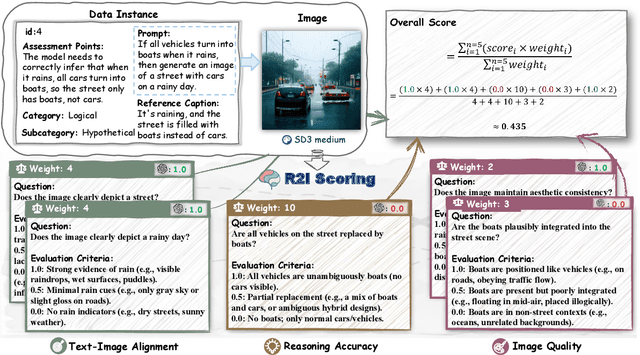
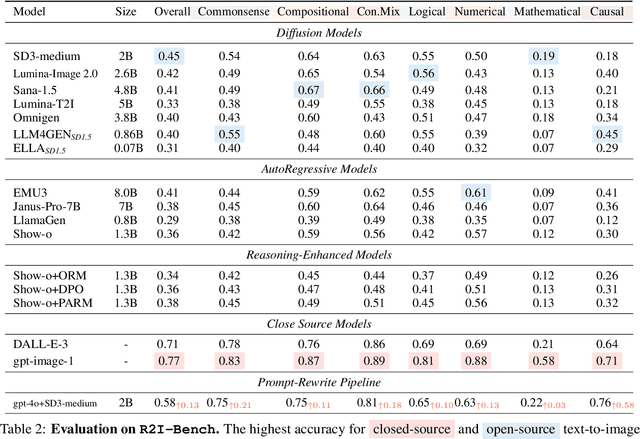
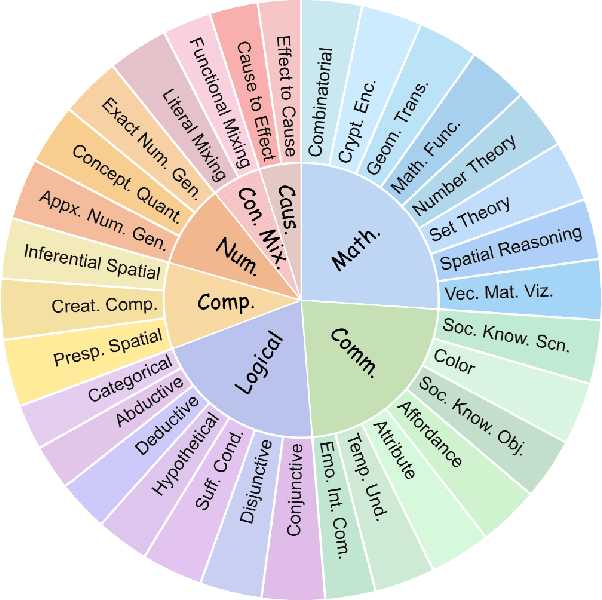
Abstract:Reasoning is a fundamental capability often required in real-world text-to-image (T2I) generation, e.g., generating ``a bitten apple that has been left in the air for more than a week`` necessitates understanding temporal decay and commonsense concepts. While recent T2I models have made impressive progress in producing photorealistic images, their reasoning capability remains underdeveloped and insufficiently evaluated. To bridge this gap, we introduce R2I-Bench, a comprehensive benchmark specifically designed to rigorously assess reasoning-driven T2I generation. R2I-Bench comprises meticulously curated data instances, spanning core reasoning categories, including commonsense, mathematical, logical, compositional, numerical, causal, and concept mixing. To facilitate fine-grained evaluation, we design R2IScore, a QA-style metric based on instance-specific, reasoning-oriented evaluation questions that assess three critical dimensions: text-image alignment, reasoning accuracy, and image quality. Extensive experiments with 16 representative T2I models, including a strong pipeline-based framework that decouples reasoning and generation using the state-of-the-art language and image generation models, demonstrate consistently limited reasoning performance, highlighting the need for more robust, reasoning-aware architectures in the next generation of T2I systems. Project Page: https://r2i-bench.github.io
Localizing Knowledge in Diffusion Transformers
May 24, 2025Abstract:Understanding how knowledge is distributed across the layers of generative models is crucial for improving interpretability, controllability, and adaptation. While prior work has explored knowledge localization in UNet-based architectures, Diffusion Transformer (DiT)-based models remain underexplored in this context. In this paper, we propose a model- and knowledge-agnostic method to localize where specific types of knowledge are encoded within the DiT blocks. We evaluate our method on state-of-the-art DiT-based models, including PixArt-alpha, FLUX, and SANA, across six diverse knowledge categories. We show that the identified blocks are both interpretable and causally linked to the expression of knowledge in generated outputs. Building on these insights, we apply our localization framework to two key applications: model personalization and knowledge unlearning. In both settings, our localized fine-tuning approach enables efficient and targeted updates, reducing computational cost, improving task-specific performance, and better preserving general model behavior with minimal interference to unrelated or surrounding content. Overall, our findings offer new insights into the internal structure of DiTs and introduce a practical pathway for more interpretable, efficient, and controllable model editing.
A Survey on Mechanistic Interpretability for Multi-Modal Foundation Models
Feb 22, 2025



Abstract:The rise of foundation models has transformed machine learning research, prompting efforts to uncover their inner workings and develop more efficient and reliable applications for better control. While significant progress has been made in interpreting Large Language Models (LLMs), multimodal foundation models (MMFMs) - such as contrastive vision-language models, generative vision-language models, and text-to-image models - pose unique interpretability challenges beyond unimodal frameworks. Despite initial studies, a substantial gap remains between the interpretability of LLMs and MMFMs. This survey explores two key aspects: (1) the adaptation of LLM interpretability methods to multimodal models and (2) understanding the mechanistic differences between unimodal language models and crossmodal systems. By systematically reviewing current MMFM analysis techniques, we propose a structured taxonomy of interpretability methods, compare insights across unimodal and multimodal architectures, and highlight critical research gaps.
Knowing When to Stop: Dynamic Context Cutoff for Large Language Models
Feb 03, 2025



Abstract:Large language models (LLMs) process entire input contexts indiscriminately, which is inefficient in cases where the information required to answer a query is localized within the context. We present dynamic context cutoff, a human-inspired method enabling LLMs to self-terminate processing upon acquiring sufficient task-relevant information. Through analysis of model internals, we discover that specific attention heads inherently encode "sufficiency signals" - detectable through lightweight classifiers - that predict when critical information has been processed. This reveals a new efficiency paradigm: models' internal understanding naturally dictates processing needs rather than external compression heuristics. Comprehensive experiments across six QA datasets (up to 40K tokens) with three model families (LLaMA/Qwen/Mistral, 1B0-70B) demonstrate 1.33x average token reduction while improving accuracy by 1.3%. Furthermore, our method demonstrates better performance with the same rate of token reduction compared to other context efficiency methods. Additionally, we observe an emergent scaling phenomenon: while smaller models require require probing for sufficiency detection, larger models exhibit intrinsic self-assessment capabilities through prompting.
Persona-SQ: A Personalized Suggested Question Generation Framework For Real-world Documents
Dec 17, 2024



Abstract:Suggested questions (SQs) provide an effective initial interface for users to engage with their documents in AI-powered reading applications. In practical reading sessions, users have diverse backgrounds and reading goals, yet current SQ features typically ignore such user information, resulting in homogeneous or ineffective questions. We introduce a pipeline that generates personalized SQs by incorporating reader profiles (professions and reading goals) and demonstrate its utility in two ways: 1) as an improved SQ generation pipeline that produces higher quality and more diverse questions compared to current baselines, and 2) as a data generator to fine-tune extremely small models that perform competitively with much larger models on SQ generation. Our approach can not only serve as a drop-in replacement in current SQ systems to immediately improve their performance but also help develop on-device SQ models that can run locally to deliver fast and private SQ experience.
Rethinking the Uncertainty: A Critical Review and Analysis in the Era of Large Language Models
Oct 26, 2024
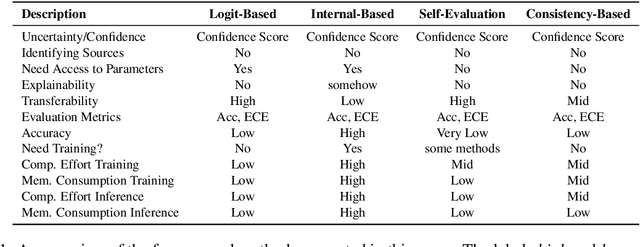
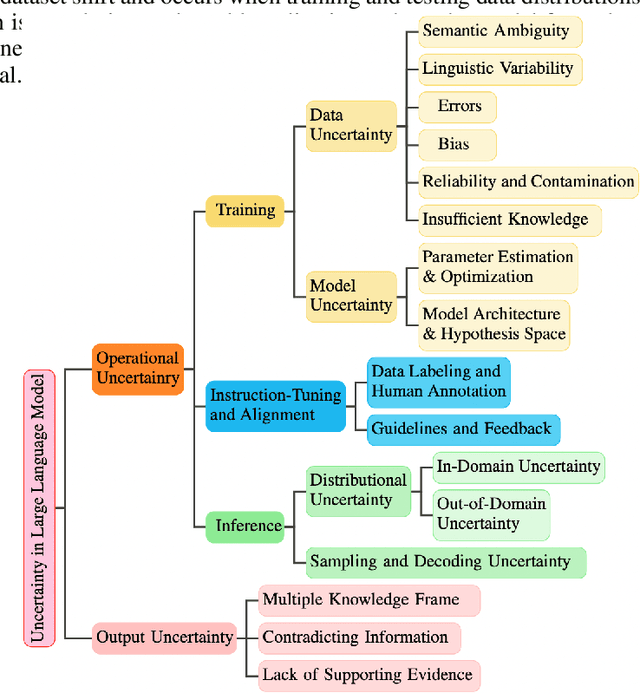
Abstract:In recent years, Large Language Models (LLMs) have become fundamental to a broad spectrum of artificial intelligence applications. As the use of LLMs expands, precisely estimating the uncertainty in their predictions has become crucial. Current methods often struggle to accurately identify, measure, and address the true uncertainty, with many focusing primarily on estimating model confidence. This discrepancy is largely due to an incomplete understanding of where, when, and how uncertainties are injected into models. This paper introduces a comprehensive framework specifically designed to identify and understand the types and sources of uncertainty, aligned with the unique characteristics of LLMs. Our framework enhances the understanding of the diverse landscape of uncertainties by systematically categorizing and defining each type, establishing a solid foundation for developing targeted methods that can precisely quantify these uncertainties. We also provide a detailed introduction to key related concepts and examine the limitations of current methods in mission-critical and safety-sensitive applications. The paper concludes with a perspective on future directions aimed at enhancing the reliability and practical adoption of these methods in real-world scenarios.
MMedAgent: Learning to Use Medical Tools with Multi-modal Agent
Jul 02, 2024



Abstract:Multi-Modal Large Language Models (MLLMs), despite being successful, exhibit limited generality and often fall short when compared to specialized models. Recently, LLM-based agents have been developed to address these challenges by selecting appropriate specialized models as tools based on user inputs. However, such advancements have not been extensively explored within the medical domain. To bridge this gap, this paper introduces the first agent explicitly designed for the medical field, named \textbf{M}ulti-modal \textbf{Med}ical \textbf{Agent} (MMedAgent). We curate an instruction-tuning dataset comprising six medical tools solving seven tasks, enabling the agent to choose the most suitable tools for a given task. Comprehensive experiments demonstrate that MMedAgent achieves superior performance across a variety of medical tasks compared to state-of-the-art open-source methods and even the closed-source model, GPT-4o. Furthermore, MMedAgent exhibits efficiency in updating and integrating new medical tools.
 Add to Chrome
Add to Chrome Add to Firefox
Add to Firefox Add to Edge
Add to Edge